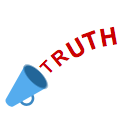Researchers - are you ready to challenge the status quo?

posted 5th August 2020
Truth is the first casualty of power.
The level of truth, brutal honest truth, you receive on a regular basis may be more to do with your social standing, formal or otherwise, than the levels of awareness of people around you.
Knowing the truth is one thing, but sharing that truth, difficult truths, truths that challenge the status quo, that’s very difficult, particularly when this truth is in conflict with power.
As a child I was told – tell the truth and shame the devil. I was also told respect your elders, which is often translated into respect / don’t challenge those in authority. As an adult I see the complexity of sensing the truth, maybe even knowing the truth and then struggling to share that truth.
Since C-19 scientists have worked hard to maintain their independence and stay focused on the facts, but some have shared their concerns about becoming the scapegoats for government as the complexity of the situation unfolds and the hard reality of the outcome of decisions bites - being the beholder of the highest number of deaths is not the trophy anyone wants. “We just did what the scientists told us.” (Or did they?)
User Researchers aren’t scientists, but we can learn from some of their principles. Independent listener, detached observer, develop a solid methodology to find answers to questions, design experiments, embed metrics and help others interpret findings.
This is the job, which can put us at odds with those that we are supporting. People want insights and I believe for the most part what these insights to be based on truth. But we also want validation (so do we seek only some truths?). We want truth, but we also want to have a sense of belonging (so we avoid conflict?). When we can’t have both, this creates personal tension. Sometimes we simply have to sit with that discomfort, sit with the personal conflict.
Having clear boundaries helps; we need to know what they are and how to manage them to navigate some of the more challenging situations we face.
Boundary #1: Researchers aim to inform decisions.
We present findings based on solid methodology, but we often don’t make the decision. It is product and service owners that need to decide what they do with the data. User research is just one data point. User insights need to be balanced with technical constraints and business strategy. Decision-makers have to balance these , sometimes conflicting, considerations. Decisions are complex. We don’t live in a perfect world. Sometimes the facts are not the only things that matter.
Boundary #2: Researchers are independent observers and listeners.
We don’t validate stakeholder assumptions about target users, we explore needs and uncover problems. We design experiments, execute and then observe what happens.
Our role is not to simple validate designs – we test them directly on users and share the findings. It is the users, not the Researchers, who validate or refute hypotheses or potential solutions.
We help raise awareness of what is now and what is possible in the future. We may make recommendations for a more responsive solution – but these are based on identifying an intersection between what matters to internal stakeholders as well as users.
Boundary #3: Researchers are neutral.
Our research needs to be rooted in the core question at hand, not a pre-determined solution. When we’re in discovery mode we are solution-agnostic. I’ll say that again – solution-AGNOSTIC. That means no matter how hard the designer has worked on their concept, or how much pressure the product owner is to “get on with it”, insights are drawn from what we learn based on probing and observing.
This is how we best serve others – by focusing on the core question, being transparent about our approach and staying true to the findings. We need the power to do that.
So the next time a Researcher presents findings to you, ask questions about the question, challenge the methodology, probe the execution, because when all of these elements of the process are solid you can be sure so too are the findings, whether you like them or not!
